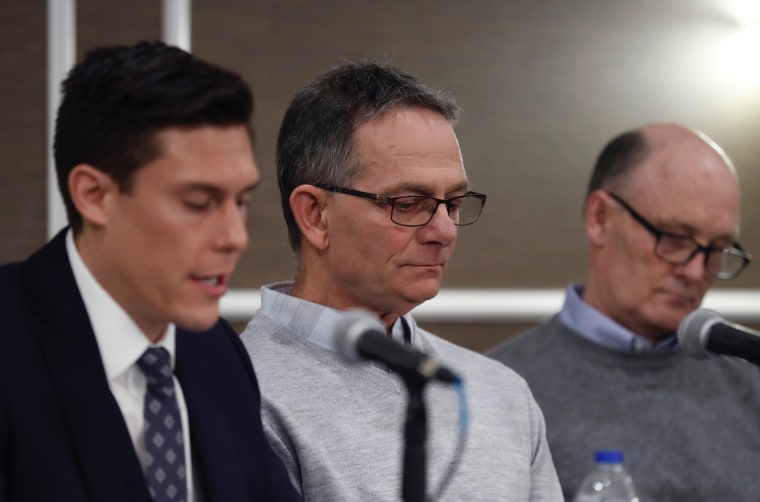The whistleblower whose allegations of sexual abuse at the hands of a University of Michigan doctor sparked a police investigation and continue to roil the school said Thursday that he's been seeking justice since 1975.
The former wrestler, Tad DeLuca, said that was the year he was punished for reporting in a nine-page letter what he says the late Dr. Robert Anderson did to him repeatedly under the guise of medical examinations.
"Something is wrong with Dr. Anderson," DeLuca wrote in a letter that was read at a news conference by his attorney, Parker Stinar. "Regardless of what you go in there for, he always makes you drop your drawers."
DeLuca said he told his coach, Bill Johannesen, and the athletics director at the time, Don Canham, that Anderson had routinely fondled him and given him unnecessary rectal exam.
Anderson, DeLuca said, was widely known as "Dr. Drop Your Drawers Anderson."
But Johannesen, DeLuca said, humiliated him for speaking out about Anderson by reading his letter out loud to the rest of the team before he was then booted off the squad and lost his scholarship.
"Mr. DeLuca, you will not return to my wrestling room whether your scholarship is in effect," Johannesen said, according to DeLuca's letter. "You will not be known as an athlete."
DeLuca told reporters: "Those few minutes in front of my friends and teammates, the coach stripped away everything I had ever been."
Now DeLuca and nearly a dozen other male former University of Michigan students — a group that includes former wrestlers and former members of the track, hockey and football teams — have come forward to say they, too, were victimized by Anderson.
Anderson, who died in 2008, was a former director of the University Health Service who also served as the top physician for the Michigan football teams led by coaches Bo Schembechler and Lloyd Carr.
"It is time to hold the University of Michigan accountable," said Stinar of the Denver-based law firm Wahlberg, Woodruff, Nimmo & Sloane, which is representing DeLuca and several other former Michigan athletes.
Stinar said they have not yet filed a lawsuit but have scheduled a meeting with the university's general counsel that will happen "in the near future."
Police in Washtenaw County, Michigan, launched an investigation of Anderson in 2018 based on a second letter DeLuca wrote. But Steven Hiller, the county's assistant chief prosecuting attorney, said no charges could be filed because Anderson is dead and none of the accusations alleged acts that fell within the state's six-year statute of limitations.
Nevertheless, the police investigation noted that Michigan staffers were "aware of rumors and allegations of misconduct" by Anderson. And last week, university President Mark Schlissel apologized on behalf of the university to anyone harmed by Anderson.
"As a physician, scientist, father and university president, I condemn all sexual misconduct, especially instances that occur under the purview of our public mission," Schlissel said. "This type of conduct is reprehensible, and whether it takes place now or in the past, it is unacceptable. ...
"On behalf of the university, I apologize to anyone who was harmed by Dr. Anderson."
Download the NBC News app for breaking news
The Anderson investigation was launched after DeLuca, a married father of three and retired teacher who lives in northern Michigan, wrote the university a second letter two years ago.
DeLuca said he was inspired to try again by the female gymnasts at Michigan State University who reported that they had been abused by sports doctor Larry Nassar.
"I will not be ignored again," DeLuca said.
Former Michigan wrestler Andy Hrovat, who competed in the 2008 Olympic Games and was the first athlete to identify publicly as an Anderson victim, said he expects hundreds more men who have been living with the secret for decades will come forward with abuse allegations.
"It's really hard to look at yourself as a victim," Hrovat said. "In our culture, it's make no excuses, you're not a victim, you have to push through it. ... This guy preyed on athletes because he knew they weren't going to talk."
Johannesen, who coached the Michigan wrestling team in the 1970s, could not be located for comment. But in an earlier statement obtained by The Associated Press, he insisted that nobody ever directly reported any abuse by Anderson to him.
"I would have responded to that immediately because I am their father," Johannesen said. "When I am the coach for them, I am their father away from home. If they were to come to me to say Doctor Anderson did something creepy or whatever like that I would have pursued it. Like a father, protecting his athletes. Creepy or whatever."
The AP also reported that Johannesen told police that none of the athletes told him they had been abused by Anderson but that he did recall hearing them "joking" about Anderson.
Canham, who was the athletics director from 1968 to 1988, died in 2005.
The Anderson case echoes the ongoing Dr. Richard Strauss scandal at Ohio State University, where 350 men have accused the university of having failed to protect them from a predator doctor.
The resulting investigation by an independent law firm, which concluded that coaches and administrators at Ohio State knew for decades that Strauss was sexually abusing young men but failed to stop him, was also ignited by a whistleblowing former wrestler. His name is Mike DiSabato.
DiSabato told NBC News that he and other former Ohio State athletes have been in touch with several of the Michigan abuse accusers and are providing moral support and guidance. "We got their backs," he said.

